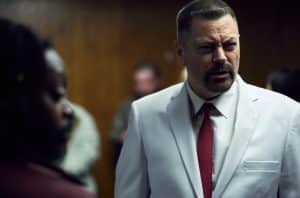In May, Greg Bailey, a drama teacher at Temecula Valley High School in Temecula, California, was placed on administrative leave for (allegedly) forcing a student to read Tony Kushner’s Angels in America for a class assignment, which the mother of the student claimed that her child didn’t want to read.
The play explores hard-hitting LGBTQ+ issues from a historical and practical standpoint—subject matter that Bailey insists he explained to the students when making the assignment. Also, Bailey claims Arthur Miller’s The Crucible and Tennessee Williams’ A Streetcar Named Desire were two other plays students were allowed to choose from.
Nevertheless, the Temecula school board, dominated by a recently-elected slate of three conservatives, voted to place Bailey on leave. The same members had made national headlines in July for rejecting a state social studies curriculum for including the slain gay activist Harvey Milk.
Students and parents rallied in support of Bailey, and he was allowed to return to the classroom when classes resumed in the fall. But as a politically centrist LGBTQ+ person, I find that critical issues are getting lost in this polarized debate over school curricula, and students’ interests and their education are being ill-served.
According to Bailey, the student’s mother never talked to him directly about the play. She alleges she emailed Bailey and never received a reply from him nor the school. Bailey, in response, says the mother never reached out to him nor did she ever approach him and just went straight to the school board.
Since Temecula’s new school board took charge in January 2023, the “conservative majority” have entered with a political agenda, making appearances on “Fox and Friends” to discuss critical race theory and its ban in the district. The conservative majority have been backed by the 412 Church, which is run by Pastor Tim Thompson, who labeled Bailey as a “groomer.” This situation falls in line with the conversation on what is appropriate and inappropriate for students to read. It’s important to look at both sides.
LISTEN: Raising a Transgender Child in an Increasingly Transphobic Country, with Brett Freeman
Growing up, I found that queer representation was scarce. Any representation I did see was based on stereotypes perpetuated by Hollywood. From the gay cowboys married to women in Brokeback Mountain to the overly feminine twinks of Another Gay Movie, Hollywood only gave us the extremes because that’s what was marketable.
To Tony Kushner’s credit, Angels in America goes beyond this. The characters are well-rounded and don’t solely rely on an outdated monolith. Kushner’s character development alone is enough for educators to assign students to analyze the play. But, for me personally, it feels redundant to have most LGBTQ+ students experience with LGBTQ+ material in school be a play that doesn’t given them a modern perspective.
For example, the character Joe Pitt is a direct representation of closeted conservative gay men. He is a man in denial of his homosexuality who ultimately leaves his wife for another man. He rings true to the stereotype of closeted gay men in the 60s and 70s who would sneak out to public restrooms for anonymous sex.
Another closeted gay man, Roy Cohn, is a power broker who turns his back on other gay men until he contracts AIDs himself.
A third character, Louis Ironson, leaves his partner Prior Walter after Walter reveals he contracts AIDs. Their journeys include graphic depictions of sex and confrontations on their moral compasses. In other words, the homophobia within society during the time period leads them to turn against each other. Given the national disdain towards the gay community at the height of the AIDs epidemic, the characters and their motivations and tactics are understandable and realistic from an artistic perspective.
READ: First They Came for Our Library. Next They’re Coming for Yours.
To be clear, it’s important to note the journey we (the LGBTQ+ community) have taken as a community and have candid discussions on our successes and shortcomings. We still have a long way to go. But, in a time where queer people are more inclined to come together and advocate for ourselves, I question the logic of introducing high school students to the play.
Of course, cruising, drug use, and HIV are all topics still prevalent in our community and the country. The gay community was frowned upon for these things. I simply suggest we fix the image. We have other LGBTQ+ works that, while honest, bring a sense of hope for the next generation. To me, it’s important to showcase these works to them because it will inspire them to change the culture.
If you took away the Pulitzer Prize component of the assignment, you open up more options. For example, Bert V. Royal’s Confessions of a Teenage Blockhead follows the Peanuts gang (in an unauthorized interpretation) as they navigate high school and tackle many hot button issues. The main character CB (alluded as Charlie Brown) faces an identity crisis after the death of his dog, and finds solace with the “school reject” Beethoven (alluded as Schroeder). Another play that comes to mind is A. Rey Pamatmat’s Edith Can Shoot Things and Hit Them, which follows three kids who are abandoned on a farm in middle America. Two of the characters, Kenny and Benji, develop a relationship as Kenny cares for his little sister, Edith. Both of these stories have roles that are more easily relatable to high school students.
READ: Here’s How The American Library Association Is Working To Protect LGBTQ+ Librarians
The state of the Temecula school district’s future is still up in the air. In August, the majority conservative board voted in the Parental Notification policy, which would require teachers to “out” transgender students to their parents. A neighboring district, Murrieta, previously enacted this rule.
Regardless of where this leads, I pray Temecula lets the good outshine the bad. There are multiple ways to inspire LGBTQ+ youth to embrace themselves in ways that are healthy and safer. I pray we, the LGBTQ+ community, continue to expand our horizons in what literary voices we want to present rather than go to shock value we can’t defend.
This article was originally published in The Progressive and reprinted here with permission.






